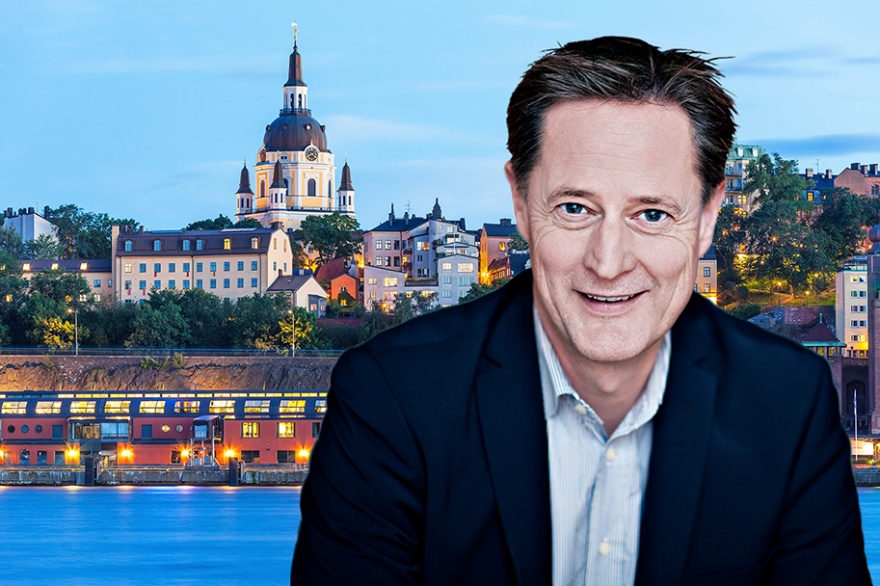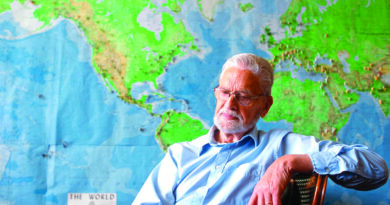Erik Brandsma, Swedish Energy Agency
Erik Brandsma, Director General of the Swedish Energy Agency, is fighting for a greener world. Having worked at different institutions in Paris, New York and Vancouver, his career has focused on energy management and sustainability. Swedish Press recently spoke to him about his mission and the importance of green living.
How did you get involved with sustainable consumption and production?
I grew up in the Netherlands. After earning a degree in forest management, I continued my studies in Vancouver, Canada, where I earned a Master’s degree in Natural Resources Management.
My first real job was with the Dutch Ministry for Environment and Spatial Planning with a team that prepared the second National Environmental Policy Plan (1990-93). My next assignment was at the Environment Directorate at the OECD HQ in Paris, where I was responsible for issues and a work program related to sustainable consumption and production.
After three years in Paris, I was asked to join the United Nations. We packed our bags and moved to New York to work for the Commission for Sustainable Development.
I was with the UN for four years. From New York I moved to Sweden with my family in 2000 to continue working in different capacities with sustainable development strategy and implementation. In 2006, I signed on with two major European power and gas companies as Vice President of Sustainability and Chief Sustainability Officer, respectively. Since energy management and sustainability had been the two common threads in my professional life, becoming Director General of the Swedish Energy Agency was a logical next step.
What does your job as Director General of the Swedish Energy Agency entail?
The Swedish Energy Agency’s long-term mission is to work for a sustainable energy system in Sweden. This includes society in general, as well as transportation and industry.
Our agency focuses on analysis, scenarios, statistics and policy instruments in a wide variety of areas, such as energy efficiency, climate change and renewables.
We have a significant research and innovation budget and a well-established program for business development. I manage a fantastic team of almost 400 experts within all these areas. I need to make sure that our employees enjoy their job, deliver quality results and get home safely to their families and loved ones at the end of the day.
It’s a privilege to work on an issue that is so crucial for our future well-being and all the while be connected with Sweden’s political policy-making arena.
What does sustainability mean to you?
In essence, it means that we hand over our society and planet to our children in a better condition than when we lived on it. It is unsustainable to borrow from our children for our own benefit and without the possibility to pay back our debt.
In which areas do you feel Sweden contributes most globally?
If we use the current 17 Sustainability Development Goals (SDG’s), Sweden has the responsibility to contribute and share experiences on all of them. I would say that we are amongst the leaders in the development related to clean energy, sustainable transport and cities, innovation, working conditions and equality. We also have a long history of co-operation between societal sectors such as government, business, societal interests and academia. This can be an inspiration for others since co-operation and partnership (Goal 17) are a key ingredient in achieving sustainability.
How do you think the image of Sweden is changing and developing internationally and particularly in North America?
I don’t know if it is changing very much. Sweden is seen as an open and innovative society that values human rights, equality and sustainability. I hope that this is still the case.
How do you think Sweden has achieved the success it has despite being such a small country, population-wise?
Being a small country in population is not a handicap. People need to feel confidence and trust to develop new ideas, new business and new relations. This in turn requires a stable and open society. Sweden has a long tradition of providing security and tolerance mainly through government policy and societal values. The fact that we rank high on innovation (e.g. number of unicorns/capita), quality-of-life and sustainability listings underlines this. I can also conclude that Swedish prosperity is advanced by the openness and tolerance in society and the mix of dependence and interest in international relations. We succeed because we work so well with other countries. We are a small country but we, as a nation, realize that we need the rest of the world for our future development. And we do that through trade, knowledge, resources and respect.
Sweden came out on top in a recent ranking of 80 countries in the Global Green Economy Index (2016) established by consulting firm Dual Citizen Inc. to measure national performance in green economy. Sweden’s first place reflects its ongoing commitment to climate change, mitigation and sustainable policies and practices. Why are Swedes so good at being sustainable?
Sweden has a good starting position through its virtually CO2-free energy system. This is a pre-condition for a green economy. Our major challenge regarding climate change is the transport sector, and here government, academia and business work closely together to develop and implement new sustainable solutions – not only for our planet but also purely from a competitive perspective. A green “sustainable” innovative economy is globally competitive and a pillar for a prosperous society.
How can all of us become more sustainable?
There are, of course, many things one can do for environmental sustainability, such as minimizing your carbon footprint. Think about how you travel, eat and live. Relations and curiosity are also very important. They are drivers for a sustainable society. Meet someone new and listen to his/her stories! Inspire and be inspired. The world will be a better place.
Interviewed by Sofie Kinnefors
First Published October 27, 2017






